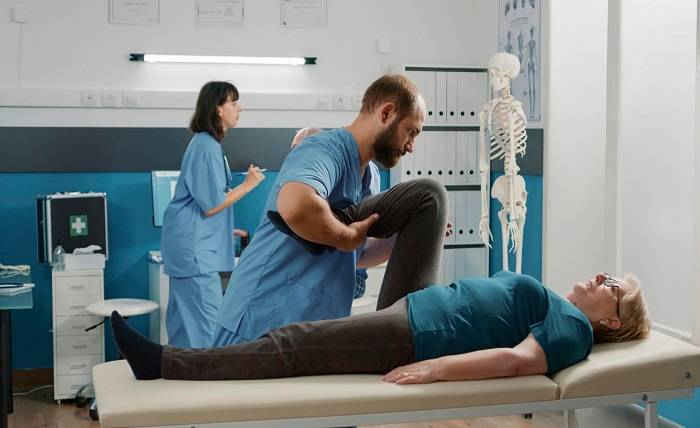What to Expect During a Surgeon Consultation Before Knee Replacement Surgery

Knee replacement surgery is a common procedure that can significantly help people with severe knee pain, often due to osteoarthritis, rheumatoid arthritis, or traumatic injury. The decision to undergo this surgery is significant and typically follows a comprehensive consultation with a surgeon. We will examine what to expect during a surgeon consultation before knee replacement surgery.
Knee replacement surgery is a common procedure that can significantly help people with severe knee pain, often due to osteoarthritis, rheumatoid arthritis, or traumatic injury. The decision to undergo this surgery is significant and typically follows a comprehensive consultation with a surgeon. We will examine what to expect during a surgeon consultation before knee replacement surgery.
Purpose of the Consultation
The primary purpose of the surgeon consultation is to determine whether knee replacement surgery is the best course of action for you. The surgeon will assess your overall health, knee condition, and personal circumstances to make this decision. This consultation also provides the chance to ask questions, express concerns, and understand the procedure, its risks, benefits, and the recovery process.
Medical History Review
The consultation will typically begin with a review of your medical history. The surgeon will ask about overall health and health history. They will also want to know about your knee pain – when it started, how it has progressed, what treatments you have tried, and how it affects your daily life. This information helps the surgeon understand the context of your knee problems and any potential risks for surgery.
Physical Examination
After discussing your medical history, the surgeon will physically examine your knee. This will involve assessing the range of motion in your knee, its stability, and strength. The surgeon will also look for any visible signs of disease, such as swelling or deformity. This examination helps the surgeon understand the extent of the damage to your knee and how it might affect your movement and function.
Diagnostic Tests
The surgeon may also order diagnostic tests to get a more detailed picture of your knee. These could include X-rays to assess the extent of damage or deformity in the knee joint, MRI scans to get a clear image of the knee structures, and blood tests to check for infection or issues with past medical history. The results of these tests will help the surgeon plan the surgery and anticipate any potential challenges.
Discussion of Treatment Options
Once the surgeon completely understands your knee condition and overall health, they will discuss the treatment options with you. While knee replacement surgery may be one option, other non-surgical treatments are worth considering, such as physical therapy, medications, or injections. If surgery is recommended, the surgeon will explain the procedure in detail, including the type of knee replacement they recommend (total or partial), the type of prosthesis, and the surgical approach.
Risks and Benefits of Surgery
While the surgery can significantly improve pain and function for most people, it does carry risks, including infection, blood clots, and complications from anesthesia. The surgeon will explain these risks and how they are managed. They will also discuss the expected benefits of the surgery, including pain relief, improved mobility, and enhanced quality of life.
The Recovery Process
Understanding the recovery process is a crucial part of the consultation. This phase follows the knee replacement surgery, where the focus shifts from the operating room to healing, regaining strength and mobility, and returning to everyday life. The surgeon will discuss this process, setting realistic expectations and preparing you for the journey.
The surgeon will first discuss the immediate aftermath of the surgery. This includes the typical hospital stay, which can vary by person-to-person surgical approach. Generally, patients may expect to stay in the hospital for a few days following the surgery.
Pain management is a critical part of the initial recovery phase. Postoperative pain is a normal part of the healing process, but it needs to be effectively managed to ensure comfort and facilitate physical therapy. The surgeon will explain the various strategies for managing pain, including medications, nerve blocks, and non-pharmacological methods such as ice application and elevation of the limb.
Physical therapy is almost essential in the recovery process. The surgeon will discuss when to expect to start physical therapy, often as soon as the day after surgery. Physical therapy initially focuses on basic exercises to improve joint mobility and gradually progresses to strengthening exercises. The goal is to restore function, improve strength and balance, and enable you to perform daily activities independently.
The timeline for returning to daily activities varies among individuals. Factors such as the type of surgery, overall health, age, and the progress made during physical therapy can influence this timeline. The surgeon will provide a general timeline, but it’s essential to understand that each patient’s recovery journey is unique.
Your Role in the Success of the Surgery
Finally, the surgeon will discuss your role in the success of the surgery. This includes following pre-surgery instructions, such as medication adjustments and home preparation, actively participating in physical therapy after the surgery, and adhering to follow-up appointments and care instructions. Your commitment to these steps is crucial for a successful outcome.
The surgeon consultation is critical in the journey toward knee replacement surgery. It allows you to understand your knee condition, the surgery, and the recovery process and make an informed decision about your treatment. Going into the consultation prepared and with a list of questions can help you make the most of this opportunity. Remember, the goal of this consultation is not just for the surgeon to assess your suitability for surgery but also for you to feel confident and informed about the next steps in your care.
The surgeon consultation is critical in the journey toward knee replacement surgery. This process is no different at Kardiolita Hospital, a renowned medical facility serving patients worldwide, including Ireland. The hospital allows you to understand your knee condition, the surgery, and the recovery process and make an informed decision about your treatment.
Going into the consultation prepared and with a list of questions can help you make the most of this opportunity. Kardiolita Hospital encourages patients to actively participate in the consultation process. The hospital’s team of experienced surgeons and medical professionals are ready to answer any questions you may have, understand their Irish patients’ unique needs and concerns, and provide services to ensure a smooth process, from initial consultation through recovery.
Remember, the goal of this consultation is not just for the surgeon to assess your suitability for surgery but also for you to feel confident and informed about the next steps in your care. Kardiolita Hospital is committed to ensuring that every patient, regardless of origin, receives comprehensive information and feels entirely prepared for improved health through knee replacement surgery.
The hospital’s commitment extends beyond the consultation room. Kardiolita Hospital provides assistance with travel arrangements, accommodation, and communication with local healthcare providers back in Ireland to ensure continuity of care. This comprehensive approach to patient care ensures that Irish patients seeking knee replacement surgery at Kardiolita Hospital feel supported and cared for every step of the way.




